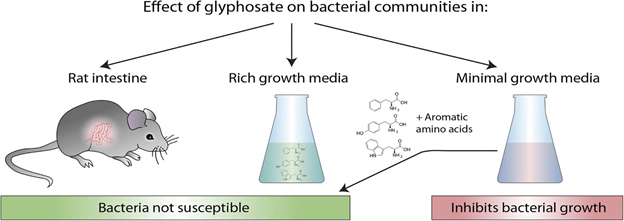In initial in vitro experiments, the researchers found that the minimum inhibitory concentration of a commercial glyphosate formulation for bacteria representative of the human gut microbiota was much lower in media which was not supplemented with aromatic amino acids compared to media with supplementation of those amino acids.

Graphical abstract from Nielsen, et al., 2018.
Sprague Dawley® rats from Taconic Biosciences were exposed to glyphosate on a daily basis for two weeks via oral gavage. Only very limited differences in the gut microbiome of rats were observed between control and glyphosate treatment groups. The researchers attributed this minimal microbiome perturbation to the presence of sufficient levels of aromatic amino acids in the gut, which can substitute for amino acids which would normally be synthesized by the bacteria.
While this work is not definitive and may not translate to humans who are malnourished or on special diets, it does provide some evidence that glyphosate exposure has limited impact on the human microbiome.















.jpg)

.jpg)
.jpg)
.jpg)
.jpg)





.jpg)


.jpg)
.jpg)

.jpg)


.jpg)





.jpg)

.jpg)




